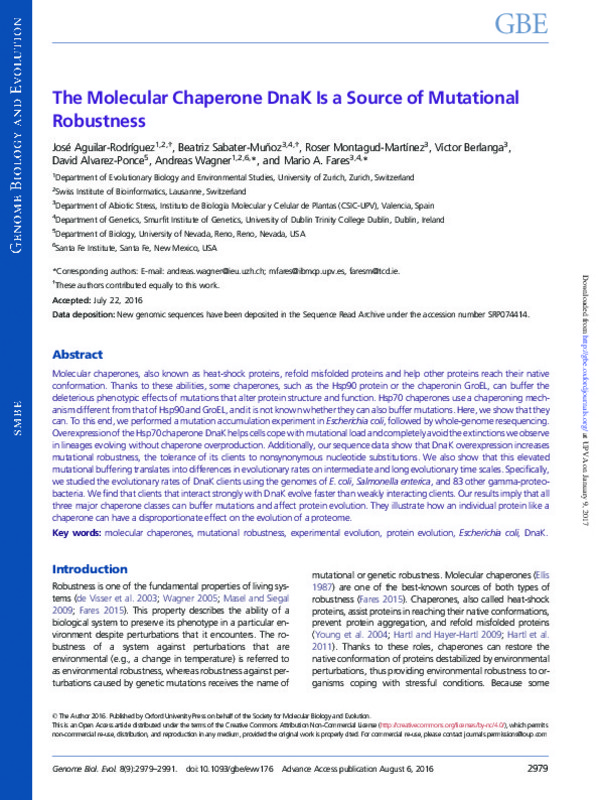|
Resumen:
|
[EN] Molecular chaperones, also known as heat-shock proteins, refold misfolded proteins and help other proteins reach their native
conformation. Thanks to these abilities, some chaperones, such as the Hsp90 protein or the ...[+]
[EN] Molecular chaperones, also known as heat-shock proteins, refold misfolded proteins and help other proteins reach their native
conformation. Thanks to these abilities, some chaperones, such as the Hsp90 protein or the chaperonin GroEL, can buffer the
deleterious phenotypic effects of mutations that alter protein structure and function. Hsp70 chaperones use a chaperoning mechanism
different from that of Hsp90 and GroEL, and it is not known whether they can also buffer mutations. Here, we show that they
can. To this end, we performed a mutation accumulation experiment in Escherichia coli, followed by whole-genome resequencing.
Overexpression of the Hsp70 chaperone DnaK helps cells cope with mutational load and completely avoid the extinctions we observe
in lineages evolving without chaperone overproduction. Additionally, our sequence data show that DnaK overexpression increases
mutational robustness, the tolerance of its clients to nonsynonymous nucleotide substitutions. We also show that this elevated
mutational buffering translates into differences in evolutionary rates on intermediate and long evolutionary time scales. Specifically,
we studied the evolutionary rates of DnaK clients using the genomes of E. coli, Salmonella enterica, and 83 other gamma-proteobacteria.
We find that clients that interact strongly with DnaK evolve faster than weakly interacting clients. Our results imply that all
three major chaperone classes can buffer mutations and affect protein evolution. They illustrate how an individual protein like a
chaperone can have a disproportionate effect on the evolution of a proteome.
[-]
|
|
Código del Proyecto:
|
info:eu-repo/grantAgreement/UZH//FK-14-076/
info:eu-repo/grantAgreement/SFI/SFI Investigator Programme/12/IP/1673/IE/
info:eu-repo/grantAgreement/MINECO//BFU2012-36346/ES/EL PAPEL DE LA DUPLICACION GENICA EN LA COMPLEJIDAD DE SISTEMAS BIOLOGICOS: RE-DIRECCION DE DINAMICAS MUTACIONALES Y ORIGEN DE INNOVACIONES BIOLOGICAS/
info:eu-repo/grantAgreement/SNSF//31003A_146137/CH/Phenotypic innovation, robustness, and recombination in genome-scale metabolic networks/
info:eu-repo/grantAgreement/SFI/SFI Investigator Programme/12%2FIP%2F1673/IE/Understanding the role of molecular chaperones in robustness and functional innovation/
|
|
Agradecimientos:
|
The authors thank Xiaoshu Chen and Jianzhi Zhang for kindly providing us with the gene expression data. This work was supported by the Forschungskredit program of the University of Zurich (grant FK-14-076 to J.A.), the ...[+]
The authors thank Xiaoshu Chen and Jianzhi Zhang for kindly providing us with the gene expression data. This work was supported by the Forschungskredit program of the University of Zurich (grant FK-14-076 to J.A.), the Swiss National Science Foundation (grant 31003A_146137 to A.W.), the University Priority Research Program in Evolutionary Biology at the University of Zurich (to A.W.), the Science Foundation Ireland (grant 12/IP/1673 to M.A.F.), and the Spanish Ministerio de Economia y Competitividad (grant BFU2012-36346 to M.A.F.). We posted an earlier version of this paper in bioRxiv (doi: http://dx.doi.org/10.1101/040600) on 22 February 2016.
[-]
|








